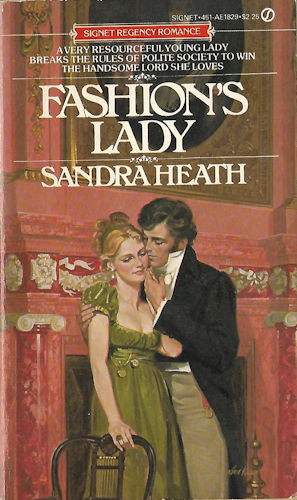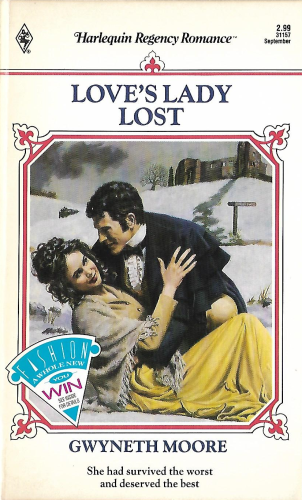
Dangerous Business
A proper young lady did not go into trade. But what was Susannah Garland to do, when she had only her dressmaking skill to keep her from the streets?
A proper young lady also did not enter into partnership with a notorious seducer like Sir Jeffrey Stratton. But what was Susannah to do, when she desperately needed his aid to open her establishment?
And, above all, a proper young lady did not listen to the wooing of another lady's husband. But what was Susannah to do, when Miles Devereux, the young lord she long had adored, asked her to help him forget his mockery of a marriage?
Susannah has to learn the price of making a profit in business - and the high cost of falling in love...
Original Publisher: Signet
Original Year of Publication: 1982
Page Count: 275
There has been an unintended hiatus to this blog, due to a long-overdue move and a lack of decent shelving to house my home library, which mostly consists of paperback novels. My vintage romance collection has been boxed up for the last 3 months, and unfortunately will continue to be for a little while longer. There is a glimmer of hope on the horizon, as bookcases are scheduled to arrive next week, albeit in pieces. But I am hopeful that I can pick up again (with regularity) by August!
The only previous experience I've had with this author is that she is not afraid to stir in some crazysauce, so I was a bit wary as I cracked this novel (newly arrived from my PBS wishlist). But, there are no wacky hijinks or forced comedic interludes here: this is straight-up trad Regency drama, which is exactly what I was looking for.
Susannah Garland is, quite literally, a poor relation. Her mother, a member of the aristocratic Devereux family, eloped with a mere schoolmaster and was basically banished from her family after that. Both of Susannah's parents died, and against her own better judgment even at 15, she accedes to her mother's wish that she return to the family fold, now headed by her mother's brother, Lord Devereux. She is
not welcomed to Sanderby, the family house; everyone treats her like a stain to be covered and forgotten, except for her cousin Miles. Susannah is so overwhelmed with relief at finding a kind soul that she fancies herself in love with him, and he returns her feelings very fervently. However, Lord Devereux is a harsh taskmaster, even to his own flesh and blood. He demands that Miles make a politically advantageous match with the daughter of the family next door, or else face being thrown into debtor's prison due to his outrageous gambling losses.
Neither Miles nor Agnes, his prospective bride, want the match, but Lord Devereux is determined to have the Winston family money to refill the coffers. Miles is quite spineless and cowardly, even from the very start of the book. He pleads with Susannah to basically stay with him as his mistress after the marriage, which he will go through with because he doesn't want to go to prison. Susannah refuses, multiple times, and ultimately comes to fear for her life when she overhears a very harsh conversation between father and son. Lord Devereux threatens to banish Susannah to his Irish estates in order to keep her away from Miles; Susannah sees the writing on the wall, knowing her uncle would just as likely have her killed as anything else. She decides to run away that very night, taking her precious few possessions with her.
Luckily for her, Sir Jeffrey Stratton happens along to Sanderby at that moment, an accident befalling his vehicle. Stratton is a mortal enemy of the Devereux family, both politically and personally, but Devereux is forced to oblige Stratton a conveyance. Stratton sends his own carriage back to London (a mere 5 miles away) and Susannah slips inside it as its leaving the grounds.
She rides into London, intent on finding her father's sister in Covent Garden. She has no idea of Covent Garden's reputation, and finds herself well and truly stuck when she learns that her aunt died two years previously. Her uncle is already on the warpath, trying to find her, so she ducks into a nearby boarding house and considers her options. Miles is obviously too cowardly to defy his father, and thus won't rescue her; she has no other living family; her uncle is out for her blood. What choice does she have to to try to find respectable work?
Susannah's mother was an extremely talented seamstress, and she taught Susannah to be equally good with the needle. She's already made a few dresses for herself, and in fact uses one of these to finagle an interview at the most exclusive dressmaker's in Town, Madame Hilary. Madame acknowledges her talent, but cannot forgive her for the audacity of arriving via the front door (instead of the side). She rather reluctantly hires Susannah on for her workroom, but offers no support when her forewoman and her footman bully her relentlessly.
Susannah is quite strong, and withstands the constant torment. The other girls in the workroom are just as miserable, but nobody wants to rock the boat. Susannah is paired with another girl, Annie Jones, on her first day, and the two quickly become friends. Susannah is quite disappointed by Madame Hilary's outmoded fashions, and knows that she could do better. Annie challenges her to sketch some designs, which soon consumes all of Susannah's free time. Meanwhile, Madame picks her to run errands around Town for the shop, thanks to her refined accent and manners. Susannah knows that she is merely being used, but she doesn't care: she's starting to nurture a dream of opening her own fashion house, one to rival even Madame Hilary's. She knows exactly which clients she'd lure away, too: the ones Madame feels are beneath her notice, and for whom she gives ugly, unflattering clothes. Madame is too busy sucking up to the elites of the ton, and the royal family, to care about those considered "lesser than."
A chance encounter with Princess Amelia exposes Susannah's flair for design, and when Madame Hilary learns of Susannah's background, she blackmails her into handing over her design sketches, which of course Madame Hilary steals credit for. Suddenly she's producing new, exciting fashions and attracting even more attention than ever before. Agnes Winston even decides to have her wedding gown made by Madame's establishment, and Madame is gleeful, forcing Susannah to design the dress because she believes it will hurt her to have to stitch the very gown for the woman "stealing" Miles away from her.
Miles has discovered Susannah's whereabouts, and persuades her to meet him secretly at night. His constant whining about his untenable position, coupled with her months of working in the real world, open Susannah's eyes and makes her realize that her childish infatuation is just that. She doesn't love Miles anymore, at least not romantically, but she does pity him and his situation. She refuses (again) to be his mistress, but Miles is unrepentant. He proclaims his love for her over and over again but does exactly nothing to change his situation. He is a spineless creep and we're barely a third of the way into the book.
Susannah and the other seamstresses are given the chance to go to the church and see their work for the wedding party; against her better judgment (for she has now met Agnes and knows what a bitch she is), she decides to attend, and joins the crowd gathered outside the church to watch the wedding party arrive. She's so intent on looking at the gowns she helped make that she doesn't realize when Miles spots her in the crowd until his uncle suddenly arrives at her side and grabs her arm, threatening her to hell and back because he believes she's there to cause a scene.
She's rescued by Sir Jeffrey, who is also amongst the crowd and is curious as to why Lord Devereux is so furious with a very pretty girl. Jeffrey extracts her from the situation and they leave as the wedding party goes into the church. Susannah confesses who she is and why her uncle hates her so much, and Jeffrey is intrigued. He hates Lord Devereux and Miles just as much, and sees an opportunity to use Susannah to advance his own, quiet revenge on them. It seems Devereux's father cheated Sir Jeffrey's father out of a large amount of money, hence his grudge against them. He tells Susannah all of this, so when he offers to finance her dream of opening her own establishment, she walks into the partnership quite knowingly. Jeffrey also warns her that people will believe that she is his mistress, but being so close to her ultimate dream makes it worth the risk. Susannah agrees, and sets out to find a suitable property to open her shop.
Miles arrives not long into this process, telling Susannah that his father has died and he's now Lord Devereux. He means to set aside his marriage to the harridan Agnes and take Susannah in her stead, but Susannah refuses. She doesn't love him anymore, and besides, she's
thisclose to her dream. Miles is quite ugly to her, implying that he believes she is Jeffrey's mistress, and warns her that he'll be back.
Susannah opens her shop, even when the grand showroom is destroyed on the eve of the grand opening, and suppliers around Town refuse to do business with her under threat of losing Madame Hilary's trade. Her first client is Jeffrey's (ex-) Mistress, Lady Cowper, who is sufficiently impressed with Susannah's determination in the face of disaster that she orders a gown from her and spreads the word of her shop, just as Susannah had hoped. She'd made a supreme personal sacrifice to her own pride in asking Jeffrey to ask his mistress to help; this is when she learns that they are no longer together, and though Jeffrey is invested in the financial success of Susannah's shop, he's not quite so personally invested in bringing her clients.
Susannah's shop flourishes; she hires her friend, Annie Jones, as her forewoman, and puts together a warm and inviting workroom. She attracts those who were not treated well by Madame Hilary, and soon it becomes obvious who the true designer was from the previous season. Susannah's start is on the rise, but her personal life is in shambles. She learns that Jeffrey has won the deed to Sanderby from Miles in a card game, and that Miles has deteriorated even more into his vices. Jeffrey is planning to close up Sanderby instead of letting Miles and Agnes live there. Miles continues to come round to Susannah, pleading for her to love him even though he is married and expecting a child. Susannah has fallen in love with Jeffrey, who holds her at arm's length and seems to still be in mourning for his late wife.
The years roll on; as Susannah's shop becomes the most exclusive ladies dressmaker in Town, more people are gunning for her. Miles manages to force her into a compromising situation, which leads Jeffrey to believe she's taken Miles as a covert lover; he's even more icy and cool than ever, and says some pretty awful things to her. Still, he doesn't abandon her, especially as Miles becomes more and more obsessed with her. Agnes has left him and openly taken up with a lover, so he feels entitled to do the same. Susannah still cares for Miles, but realizes the danger she's in with him. A chance for the royal warrant comes her way, and she only has to keep her reputation intact and it's hers; that's when Miles makes his final move: he demands Susannah marry him, or he will destroy her reputation as a dressmaker, leaving her with as much as she had at the beginning of the book: nothing.
The final chapter is a breathtaking climax of a scene, where everything
finally comes out into the open, and Susannah is forced to make her choice. Jeffrey holds the key, in Sanderby, but no one is sure that Miles will accept anything less than the woman he's become so obsessed with.
I really enjoyed this book. I loved Susannah: she is a strong, determined, clear-minded character who knows how to get what she wants without straying into absurdity. She is quite brave in the face of a lot of nastiness and just keeps going for her goal, though what she wants more than anything is for Jeffrey to love her. Jeffrey is a suitable, if obstinate hero; Miles is a suitably disgusting jerk and it was really nice that Susannah discovers this fairly early in the book. She can't quite bring herself to hate him, not even in the end when he's threatening her livelihood and her happiness, which is more than I can say for myself, LOL.
Real historical figures are scattered throughout, and the fierce political backdrop of the early wars with Napoleon figure into the story, though not enough to distract from the romance. William Pitt, Lady Jersey, Emily Cowper, and the Prince Regent are a few figures to make cameo appearances (I thought it interesting that Ms Heath makes her hero one of the Lady Cowper's many lovers, that was pretty bold!).
I really loved this, and it makes me wish all the more that my vintage romances were readily available, as I have several of this author's backlist. Definitely recommend!
⭐⭐⭐⭐



















